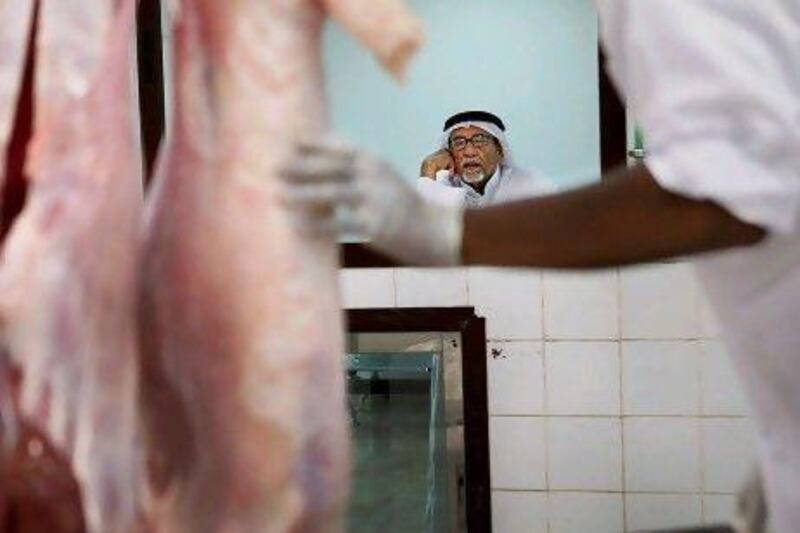ABU DHABI // An automated slaughterhouse is to open in time for Eid Al Adha.
The abattoir, at Al Wathba, will have a capacity of 200 sheep an hour, Abu Dhabi Municipality says.
There are four slaughterhouses in and around Abu Dhabi island: one for commercial use on the island, and three for public use on the island, and in Shahama and Baniyas.
The Al Wathba facility is to be open only during Eid Al Adha.
Capacity at each of the slaughterhouses will increase for Ramadan and Eid.
The largest facility on the island, at Mina Zayed, can kill 250 sheep an hour.
The Baniyas facility serves Khalifa City A and B, and Mohammed Bin Zayed City, and has a capacity of 4,500 cattle a day.
"Normallythis facility, with its increased capacity, we use for Eid Al Adha when everybody jumps in at the same time in the morning after prayers," said Khalifa Al Rumaithi, director of public health at the municipality.
"We increased the chambers of slaughtering at Baniyas. In the holy month of Ramadan we are also very busy but in comparison to Eid Al Adha the pressure remains less."
If between 2,000 and 3,000 arrive at the slaughterhouse at the same time, it becomes very difficult to manage, Mr Al Rumaithi said.
The slaughterhouses' normal hours are 6am to 6pm, but during Ramadan opening times are extended to between 6am and 2am. Three shifts of workers accommodate demand during the holy month."Nobody is allowed to go on leave during this month only," Mr Al Rumaithi said. "The demand for meat goes up higly especially in the first week of Ramadan."
The municipality has plans to make all the slaughterhouses fully automated by 2015. The new abattoir at Al Wathba is to be fully automated, and the one in Shahama is to be converted by the end of 2013.
Mr Al Rumaithi said the slaughterhouses "serve the public for their better health and hygiene.
"Since 1972, we charge people for slaughtering a sheep only Dh15. Here the Government does not run these slaughterhouses as business establishments but it's entirely a service to the community.
"We spend more and more money on these slaughterhouses each year. If we increase the prices people will stop coming here and cut their sheep in the streets, inside villas, houses, farms, which will invite numerous health-related ailments and spread a foul smell in the entire vicinity," he said.
Veterinarians check the animals before slaughter to ensure they are disease-free.
Residents found slaughtering animals outdoors will be fined Dh500 for a first offence. They are referred to court for a second offence.
"In 2011, we fined 20 people who slaughtered outside the slaughterhouses, in 2010 and 2009 the number of such people reached up to 500 per year," Mr Al Rumaithi said. "If inspectors investigate and find blood stains on streets and leftovers of animal skins, and find the violator later, then we fine Dh1,000."






